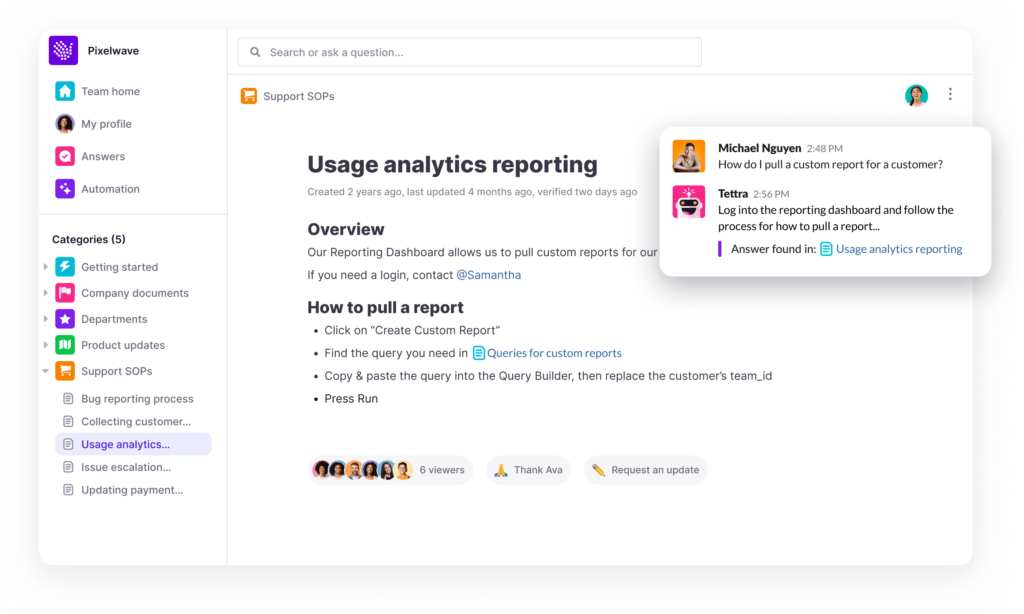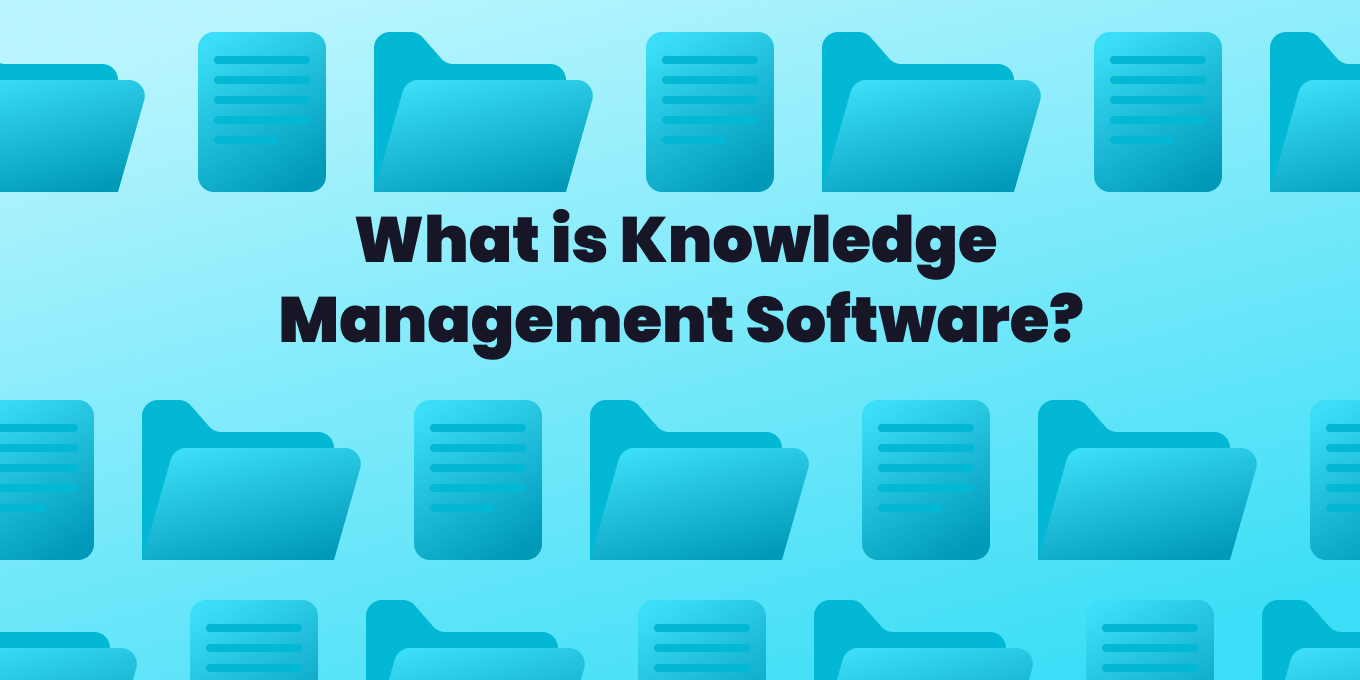Information is currency.
For your team, for your clients, and for your customers.
However, it’s not always about gaining more information –it’s also what you do with it.
How you organize it, how you share it, and how you maintain it.
That’s what knowledge management software is all about.
In this article, we’ll dive into the intricacies of knowledge management software, its evolution, key features, benefits, challenges, and a spotlight on Tettra, a leading player in this field.
What is knowledge management software?
Knowledge management software, often abbreviated as KMS, is a technology-driven solution designed to capture, store, organize, retrieve, and distribute an organization’s knowledge assets efficiently. These assets can include company documents, training manuals, best practices, intellectual property, and insights accumulated over time.
That’s the backbone of knowledge management.
In an era where information overload is the norm, knowledge management software acts as a strategic enabler for businesses. It helps harness the collective wisdom of employees, streamlines decision-making, enhances collaboration, and ultimately drives innovation and growth.
Often, teams in customer support or operations turn to knowledge management software to help them manage clients or to make sure they have the right answers.
Did you catch that last part about having the right answers?
It’s not enough to throw in all of your docs into a searchable database, you need a way to curate it. With a top knowledge management tool like Tettra, you’ll be informed of stale content, get suggestions for pages that may need to be updated, and verify tools to give a stamp of approval.
5 key features of knowledge management software
Today, knowledge management software leverages cutting-edge technologies such as artificial intelligence, machine learning, and natural language processing to provide more advanced and intuitive solutions.
1. Content Creation and Capture
Modern KMS allows for easy content creation and capturing of knowledge in various formats, from text and images to videos and audio recordings.
2. Knowledge Storage and Organization
These systems provide robust mechanisms for storing and organizing knowledge assets in a structured and easily accessible manner.
3. Search and Retrieval
Advanced search capabilities ensure that users can quickly locate the information they need, even within vast repositories.
4. Collaboration and Communication
KMS platforms foster collaboration among team members by enabling real-time communication, co-authoring, and sharing of knowledge.
5. Analytics and Reporting
They offer insights into knowledge usage patterns, helping organizations identify areas for improvement.
5 benefits of knowledge management software
1. Improved Decision-Making
Access to organized knowledge empowers decision-makers with valuable insights, leading to better-informed choices.
2. Enhanced Productivity
Streamlined access to information reduces time wasted searching for data, boosting overall productivity.
3. Employee Empowerment
Employees feel more empowered and engaged when they have easy access to information and knowledge resources.
4. Customer Satisfaction
Quick and accurate responses to customer queries result in higher customer satisfaction levels.
⭐️ Recommended: Read more about knowledge management benefits
Why It’s Hard to Adopt Knowledge Management Software
1. Resistance to Change
Implementing KMS often faces resistance from employees accustomed to traditional workflows.
2. Data Security Concerns
Protecting sensitive information within the KMS is a top priority, requiring robust security measures.
3. Content Quality Control
Maintaining the accuracy and relevance of knowledge content can be challenging.
4. Integration Complexities
Integrating KMS with existing systems and workflows may pose integration challenges.
Why is Tettra a Top Knowledge Management Software Solution?
Want to investigate other knowledge management solutions? Get the full breakdown.
Tettra is a leading knowledge management software known for its user-friendly interface, robust features. It’s an AI-powered knowledge management system that helps you curate important company information into a knowledge base, use it to answer repetitive questions in Slack and MS Teams and keep it up-to-date, organized, and complete with automation.
With its AI bot, your team experts will get fewer questions, your organization will increase, and team members can ask questions in plain, everyday language, directly inside Slack.

Tettra in Action
Tettra has been adopted by numerous organizations across various industries. One notable example is a tech startup that used Tettra to centralize its onboarding process. By creating a repository of onboarding materials, including company policies, training resources, and FAQs, the startup streamlined the onboarding of new employees. This resulted in reduced training time, improved employee retention, and a more consistent onboarding experience.
“By the time we hired a new person, trying to train her became a nightmare. We realized we needed a single place for information…a source we could trust for up-to-date knowledge.”
– Luis Hernandez from Geckoboard
In another case, a medium-sized marketing agency implemented Tettra to manage its client communication and project documentation. By utilizing Tettra’s collaborative features, the agency’s teams could easily share campaign strategies, client preferences, and project timelines. The result? Increased transparency, faster decision-making, and improved client satisfaction.
“When we rolled [Tettra] out, the company took to it like fish to water,” said Jessica Vionas-Singer from Smartbug. “It’s such an intuitive tool that people immediately just started using it. They started asking questions, making suggestions, making new Tettra articles when it made sense within their department. Within two weeks, everybody was using it.”
4 Tips for Selecting the Right Knowledge Management Software
Choosing the most suitable knowledge management software for your organization is crucial. Here are some key factors to consider during the selection process:
1. Assess Business Needs
Start by evaluating your organization’s specific knowledge management needs. Identify the types of knowledge you need to manage, the size of your user base, and your growth projections.
2. Scalability and Customization
Ensure that the chosen KMS can scale with your organization’s growth and offers customization options to tailor the system to your unique requirements.
3. User-Friendliness
A user-friendly interface is essential for successful adoption. Look for software that is intuitive and requires minimal training.
4. Integration Capabilities
Check if the KMS can seamlessly integrate with your existing software ecosystem, including collaboration tools, CRM systems, and project management platforms. See how Tettra integrates with the tools you use most.
Implementation Strategies of Your New Knowledge Management Software
Implementing knowledge management software is not just about the technology; it also involves change management and strategy.
Note: If you’re new to Tettra, check out this Getting Started guide or contact us at [email protected] with any questions.
1. Employee Training
Provide comprehensive training to employees to ensure they can effectively use the KMS. This includes teaching them how to create, edit, and access knowledge resources.
2. Change Management
Address resistance to change by clearly communicating the benefits of the KMS to employees. Encourage buy-in from key stakeholders and demonstrate the software’s value.
3. Continuous Improvement
Establish a feedback loop to collect input from users and make continuous improvements to the system. This ensures that the KMS remains aligned with evolving organizational needs.
Future Trends in Knowledge Management Software
As technology continues to evolve, so does knowledge management software. Here are some emerging trends to watch for:
This is already here. The integration of AI and machine learning algorithms will enhance content discovery, automate knowledge categorization, and provide predictive analytics for better decision-making. And with Kai, Tettra’s AI bot, you’ll get instant answers auto-generated from your knowledge base. Simple.
The Ongoing Evolution of Knowledge Management
Knowledge management software has become indispensable for businesses seeking to thrive in the digital era. It empowers organizations to harness their collective intelligence, make informed decisions, and stay competitive in a rapidly evolving landscape.
With innovations like Tettra and the continuous evolution of the field, knowledge management software is poised to play an even more significant role in shaping the future of business.
Embracing these tools and knowledge management strategies can unlock a world of possibilities for organizations seeking to leverage their most valuable asset: knowledge.


